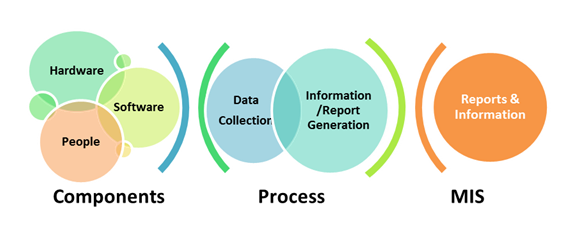MIS – Stands for Management Information System. As the name implies, MIS is a system that generates and provides Information to Management, for the purpose of managing and improving the business processes. It is a component based system that provides data and required information to management for supporting and enabling them in their decision making process.
To accomplish its task, any Management Information System needs the following components:
- Hardware: Connects with the core processes and captures and stores all required relevant data
- Software: Processes the data, converts them into usable information and reports
- Data: Is required by the management to generate reports and analyze the processes
- People: At different levels of authorization to view and modify records or information to represent sensible and interpretable information.
Uses of Management Information Systems
MIS is a vast and complex topic and plays a very important role in today’s world. There are multiple facets and uses of a Management Information System. A few of them are:
- Decision support System: Assesses various alternatives, based on quantitative and qualitative parameters defined and set in the system. DSS assists users in choosing the right alternative and making the most beneficial decisions.
- Human Resource Information System: Collects and stores data about employees of an organization. HRIS generates reports related to employee salary, annual performance appraisal, Organization structure etc.
- Customer Relationship Management: Collects sales and customer information. CRM generates reports like Sales trend, Market Basket Analysis (Analysis on products that are sold together) etc., which feeds the DSS to take business decisions.
There are other forms of Management Information Systems like SCM (Supply Chain Management), MRP (Material Requirement Planning), ERP (Enterprise Resource Planning) etc. There are many more uses and forms of Management Information Systems.
There are readily available products that can be installed, customized and used AS IS, like SAP, Oracle, Salesforce etc. These products are more generic and cater to most of the industry requirements. Users can easily buy and start using them from the developers. Since they have a wide range of functionalities and cater to almost all common business requirements, these tools are a bit costlier and not preferred and used by most organizations.
On the other hand, for very customized and rare business requirements, organizations that do not want to spend huge money on buying readily available Management Information Systems, go for developing software that caters and can be customized to their requirements.
Now that we have a general idea of what a Management Information System is and how it is used for businesses. Let us explore some of the functionalities of any Management Information System.
MIS Functionality & Benefits
- A Management Information System collects and stores data from various sources including hardware;
- Processes data as per the programmed instructions
- Generates reports required as per management’s requirement
- Provide access to selective information to different levels of authority
The below are the benefits of using a Management Information System for your business:
- Having a robust Management Information System that can produce any reports required by management, reduces time spent on producing and validating reports. A huge amount of effort is spent on analyzing the data and representing reports in a useful manner. This saved time can be spent in useful manner such as, identifying the root cause and improvement opportunities for the business.
- In complex businesses visualizing and performing some calculations can be complex, prone to oversight errors and time consuming. Using a Management Information System makes any complex transaction easier and generates accurate reports.
- With a Management Information System the number and type of reports that can be generated are numerous compared to manual reports. Thus slicing and dicing of any process becomes easy and management is able to identify useful information and use it as a competitive advantage.
- Having a Management Information System makes the job of processing huge business data easier and simpler. It simplifies the task of operations and other processes and helps them concentrate in their core business operations.
- It assists management in assessing the performance of organization towards its goals, assess the performance of departments, and standardize the method of capturing and reporting metrics across the organization.
- It helps an organization in decision support, compare alternatives and choose the best options.

